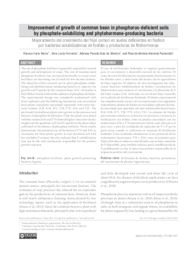Improvement of growth of common bean in phosphorus-deficient soils by phosphate-solubilizing and phytohormone-producing bacteria.
Improvement of growth of common bean in phosphorus-deficient soils by phosphate-solubilizing and phytohormone-producing bacteria.
Author(s): VIEIRA, R. F.; FERRACINI, V. L.; SILVEIRA, A. P. D. da; PAZIANOTTO, R. A. A.
Summary: Abstract: The use of phosphate fertilizers is generally required for normal growth and development of crops. The cost of manufactured phosphate fertilizers has increased drastically in recent years and are becoming out of reach for low-income farmers. The objective of this research was to select phosphate-solubilizing and phytohormone-producing bacteria to improve the growth and P uptake by the common bean (IAC Alvorada) in Red-Yellow Oxisol without the addition of phosphate fertilizer. The experimental design was completely randomized with three replicates and the following treatments: non-inoculated bean plants and plants inoculated separately with seven bacterial isolates: K24, K36, K71, T30, T79, A24, and T22. The previously treated bean plants were grown in the presence and absence of phosphate fertilization. Only the plants inoculated with the isolates K36 and T79 showed higher values for the dry weight and the quantities of P and N uptake by the shoot when cultivated in the absence of phosphate fertilizer. These results demonstrate the potential use of the bacteria T79 and K36 as inoculants for bean plants grown in non-sterilized soil with low available P content, but also indicate that P solubilization may not be the only mechanism responsible for the positivo growth response. -- Resumen: El uso de fertilizantes fosfatados se requiere generalmente para el crecimiento y desarrollo normal de los cultivos. El costo de estos fertilizantes ha incrementado drásticamente en los últimos años, y están fuera del alcance de los agricultores de bajos ingresos. El objetivo de esta investigación fue seleccionar bacterias solubilizadoras de fosfato y productoras de fitohormonas para mejorar el crecimiento y la absorción de P del frijol común (IAC alvorada) en un Oxisol Rojo-Amarillo sin la adición de fertilizante fosfatado. El diseño experimental fue completamente al azar con tres repeticiones y los siguientes tratamientos: plantas de frijoles no inoculadas y plantas de frijoles inoculadas por separado con siete aislamientos bacterianos: K24, K36, K71, T30, T79, A24 y T22. Las plantas de frijoles previamente tratadas se cultivaron en presencia y ausencia de fertilización con fosfato. Solo las plantas inoculadas con los aislamientos K36 y T79 presentaron valores más altos para el peso seco y para las cantidades de captación de P y N por la parte aérea cuando se cultivaron en ausencia de fertilizante fosfatado. Estos resultados demuestran el uso potencial de los aislamientos bacterianos T79 y K36 como inoculantes para frijol cultivado en suelos no esterilizados con un bajo contenido de P disponible, pero también indican que la solubilización de P posiblemente no fue el único mecanismo responsable de la respuesta positiva del crecimiento.
Publication year: 2021
Types of publication: Journal article
Unit: Embrapa Environment
Observation
Some of Embrapa's publications are published as ePub files. To read them, use or download one of the following free software options to your computer or mobile device. Android: Google Play Books; IOS: iBooks; Windows and Linux: Calibre.
Access other publications
Access the Agricultural Research Database (BDPA) to consult Embrapa's full library collection and records.
Visit Embrapa Bookstore to purchase books and other publications sold by Embrapa.

